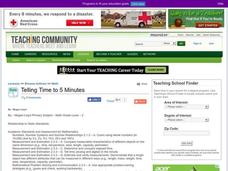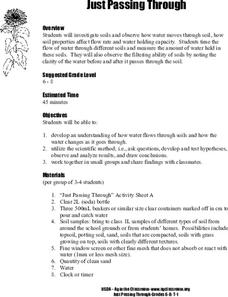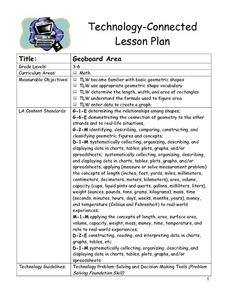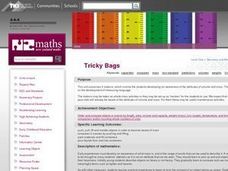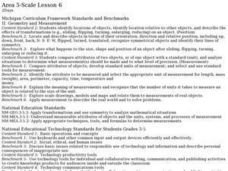NOAA
Mapping the Deep-Ocean Floor
How do you create a map of the ocean floor without getting wet? Middle school oceanographers discover the process of bathymetric mapping in the third installment in a five-part series of lessons designed for seventh and eighth graders....
NOAA
Through Robot Eyes
How do robots assist ocean explorers in collecting data and images? The final installment in a five-part series has science scholars examine underwater images collected by robots and identify the organisms shown. Groups then calculate...
Curated OER
Guessing Jar
In this guessing jar worksheet, 1st graders write down their guess for how many marbles are in the jar, then count and record the answer, and complete 3 sentences about the numbers.
Curated OER
Estimate the Number of Cherries
In this estimating worksheet, students observe groups of five cherries and estimate the total amount. Students choose one multiple choice answer.
Curated OER
Estimating Butterflies
In this estimation worksheet, students estimate how many butterflies are in the picture and have 25 or 55 to choose from. Students estimate and eventually count 25 butterflies.
Curated OER
Estimating Practice
In this number sense instructional activity, students examine the picture and estimate the number of ants in the picture.
Curated OER
Estimate Amount
In this estimating the total amount worksheet, learners observe a page of apples in groups of two and estimate whether there are twenty-five or eighty apples. Students choose one multiple choice answer.
Curated OER
Telling Time to 5 Minutes
In this second grade lesson your class will practice telling time. The goal is to tell time to five minutes using an analog clock. Your young students count by 5 minute intervals and discuss elapsed time.
Curated OER
Tick Around the Clock
Learners examine and discuss the differences between clocks they are shown. Using the internet, they research how people used to tell time before clocks. They review what the long and short hand on the clock represent and practice...
Curated OER
Box and Whiskers
Middle schoolers discover how to relate collected data with a box and whiskers graph in a number of formats. They collect, organize, create, and interpret a box and whiskers graph. Pupils interpret the difference between sets of data,...
Curated OER
Water Monitoring Vocabulary
As the title implies, this is a list of vocabulary terms relating to water monitoring. If your ecology class is learning about how to test water quality, this will be an appropriate reference sheet for them. As a bonus, if you live in...
Curated OER
Economics Quiz
Let your scholars test their economics skills with this 55-question quiz! They respond to fill-in-the-blank and multiple-choice questions pertaining to the study of microeconomics and macroeconomics. All answers are provided, and the...
Curated OER
Maps and Modes, Finding a Mean Home on the Range
Fifth graders investigate data from maps to solve problems. In this data lesson, 5th graders study maps and collect data from each map. Students present their data in a variety of ways and calculate the mode, mean, median, and range.
Curated OER
Money in Action
Students become familiar with the various coins in our money system as well as amount of each coin. They help develop their ability to count change and find different ways to show equal amounts.
Curated OER
Just Passing Through
Students explore how water moves through soil. They experiment with different soil types and record their findings.
Curated OER
Paws in Jobland Number Crunch
Learners analyze real life jobs that involve math. They discuss jobs where math is used, and explore how math is important in many areas and research some of these jobs in the book "Paws in Jobland." They complete a worksheet with four...
Curated OER
Cylinder Volume Lesson Plan
Tenth graders define the formula for cylinders and use it to solve real world problems. In this geometry lesson, pupils differentiate between area, perimeters, 2D shapes, 3D shapes, and volume of prisms, cylinders and spheres. They...
Illustrative Mathematics
Words and Music I
What type of music is best to listen to while learning? In a short writing prompt, learners must determine if a scenario involving listening to music while memorizing material is an experiment or an observational study. The prompt also...
Curated OER
Respiratory System
In this health worksheet, middle schoolers examine the human body and make mental connections to the target function highlighted in the sheet.
Pennsylvania Department of Education
Volume of Compound Figures
Fifth graders use patterns, models and relationships to solve equations. In this equations lesson, 5th graders define vocabulary for equations and complete worksheets explaining variables and solving problems.
Curated OER
Geoboard Area
Students explore the basic geometric shapes and geometric shape vocabulary through the use of geoboards and virtual geoboards. They create a variety of shapes with a partner, build ten different rectangles on their geoboards, and...
Curated OER
Volume and Mass: Identify the Attribute
Students rotate through five studying stations related to the attributes of volume and mass. They manipulate objects to explore mass, compare two masses by pushing and lifting, pack materials and fill containers, and pour liquids from...
Curated OER
Scaled Rubber Band Drawings
Learners demonstrate the process of creating a scaled rubber band enlargement of a simple drawing. They observe and discuss a teacher-led demonstration, and create a scaled rubber band enlargement of simple drawings and their invention...
Other popular searches
- Capacity Measurement
- Metric Capacity Measurement
- Liquid Capacity Measurement
- Lung Capacity Measurement
- Capacity Measurement Cooking
- Convert Capacity Measurement
- What Is Capacity Measurement
- Measurement Capacity Man
- "Capacity" Measurement
- Volume Capacity Measurement
- Measurement Capacity Game
- Customary Capacity Measurement









